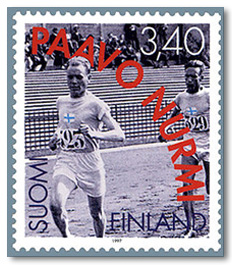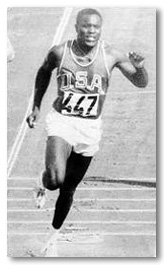Determination
- DONALD DEMARCO
Popular interest in the Olympic games involves a curious irony. Despite our culture's unswerving commitment to a life of comfort and convenience, people are drawn to the Olympic spectacle precisely because it celebrates the place of discomfort and inconvenience.
 |
Wealth without work, marriage without sacrifice, and sex without tears are bogus ideals. People really want to know how to surmount difficulty, not how to avoid it.
The great Olympic stories, the ones that survive and continue to be sources of hope, are the ones that tell about the human journey from hardship to victory. The motion picture Chariots of Fire tells of the Scottish runner, Eric Liddle, who refused to run on Sunday because of a religious objection. Liddle, with the cooperation of a Jewish athlete, traded his best event, the 100-meter, for the 400-meter, in order to avoid running on the Lord's Day. Despite taking on the added hardship of running in an event he had not trained for, Liddle streaked to victory and won a gold medal for his country.
In a previous Olympiad in London in 1908, an American student by the name of Foster Smithson protested his having to run the 110-meter hurdles on Sunday by running with a Bible in his hand. He not only won the race, but set a world record in the process.
Painful Hurdles
Canada's Anne Ottenbrite almost didn't compete in the 1984 Olympiad in Los Angeles. She missed the Canadian Olympic trials that year when she suffered a dislocated right kneecap. Nonetheless, Canadian officials decided to put her on the swimming team. Then, on arriving in Los Angeles, she suffered whiplash as a passenger in a car accident. Yet she swam to win gold, silver, and bronze medals.
Perhaps the greatest long-distance runner of all time is Finland's Paavo Nurmi. Nurmi knew all about hardship: He grew up in a one-room dwelling with four siblings and his widowed mother, who earned a meager wage as a laundress. When he was young, he trained by running behind trolley cars. At the 1924 Paris Olympiad, he won five gold medals in long-distance events over a span of just four days. He won the 1,500-meter and 55 minutes later entered and won the 5,000-meter, setting new Olympic records in both events.
Ray Ewry was the victim of an unknown disease during his childhood. He was confined to a wheelchair and doctors predicted that he would never walk. Some even predicted an early death. Nonetheless, Ewry began to perform therapeutic exercises to strengthen his legs. He ultimately developed the ability to make powerful leaps from a standing position. At age 27, he entered the first modern Olympiad in 1896 in Athens and won all three standing-jump events. He duplicated this feat in Paris in 1900. He won two more championships: Athens in 1906 and London in 1908, at the age of 35. In all, he entered 10 Olympic events and won all 10, an accomplishment that remains unequalled.
Bob Mathias was diagnosed at eight years of age as having pernicious anemia. His doctor required him to take daily afternoon naps and forbade him from participating in sports for five years. At 17, he won the grueling decathlon at the 1948 games in London, thereby becoming the youngest athlete ever to win a gold medal in track and field. Mathias won the decathlon again in Helsinki four years later.
No Defeat in Disability
 |
Rafer
Johnson
|
The Hungarian Karoly Takacs suffered the loss of his right arm in a grenade explosion in 1939. Through intense training, he learned to shoot with his left hand and won gold medals in rapid-fire pistol shooting in the Olympic games of 1948 and 1952.
Walter Davis was stricken with polio when he was eight. Although he recovered a few years later, the disease had left his legs weak, necessitating a strict regimen of leg exercises. Nonetheless, he won a gold medal at the Helsinki games in 1952, jumping three-fourths of an inch over his 6'8" height.
An illness during infancy left Harold Connolly with a withered arm that was four inches shorter than his other arm. In addition, he had broken the arm four or five times in football games. He took up the hammer-throw as a student at Boston College in order to strengthen his arm. In 1956 he set a new Olympic record in that event.
The parents of Rafer Johnson and his five siblings lived, for a time, in an abandoned railway car. When he was 12, Rafer's leg was badly mangled in a machinery accident and required surgery. Johnson went on to win the decathlon in the 1960 Rome Olympiad. He later became the director of the Kennedy Foundation, and he was chosen to light the torch at the 1984 Olympic games.
Wilma Rudolph was the 17th of 19 children born to poor parents in Tennessee. Severe pneumonia and scarlet fever at age four made one of her legs useless. For more than two years, she was confined either to a wheelchair or to bed. Her brothers and sisters took turns massaging her legs. As a result of their unremitting care, she was able to walk with special shoes by the time she was six. Ten years later she won a bronze medal at the Melbourne Olympics. At the following Olympiad she won three gold medals.
The best stories, that is, the ones from which we draw inspiration to live by, are not those of people who win huge sums of money in a lottery and then retire to become couch potatoes (Mad Couch Disease). They are the stories of people who overcome hardships through sheer determination to accomplish great things. They are stories that supply us with real hope. Perhaps our greatest disability is an absence of determination.
 This is Meaghen Gonzalez, Editor of CERC. I hope you appreciated this piece. We curate these articles especially for believers like you.
This is Meaghen Gonzalez, Editor of CERC. I hope you appreciated this piece. We curate these articles especially for believers like you.
Please show your appreciation by making a $3 donation. CERC is entirely reader supported.

Acknowledgement
Donald DeMarco. "Determination." Lay Witness (March/April 2003).
This article is reprinted with permission from Lay Witness magazine. Lay Witness is a publication of Catholic United for the Faith, Inc., an international lay apostolate founded in 1968 to support, defend, and advance the efforts of the teaching Church.
The Author






